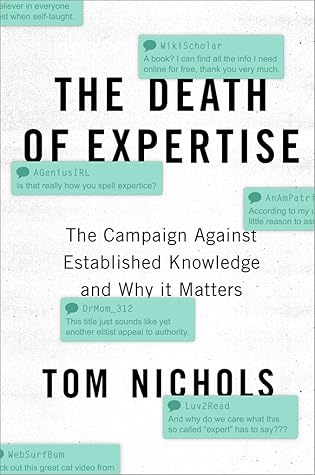More on this book
Community
Kindle Notes & Highlights
There is a cult of ignorance in the United States, and there always has been. The strain of anti-intellectualism has been a constant thread winding its way through our political and cultural life, nurtured by the false notion that democracy means that “my ignorance is just as good as your knowledge.” Isaac Asimov
These are dangerous times. Never have so many people had so much access to so much knowledge and yet have been so resistant to learning anything.
Not only is the Internet making many of us dumber, it’s making us meaner: alone behind their keyboards, people argue rather than discuss, and insult rather than listen.
A kind of intellectual Gresham’s Law is gathering momentum: where once the rule was “bad money drives out good,” we now live in an age where misinformation pushes aside knowledge.
Public debate over almost everything devolves into trench warfare, in which the most important goal is to establish that the other person is wrong.
The Dunning-Kruger Effect, in sum, means that the dumber you are, the more confident you are that you’re not actually dumb.
Part of the problem is that there are too many students, a fair number of whom simply don’t belong in college. The new culture of education in the United States is that everyone should, and must, go to college.
A study of two hundred colleges and universities up through 2009 found that A was the most commonly given grade, an increase of nearly 30 percent since 1960 and over 10 percent just since 1988. Grades in the A and B range together now account for more than 80 percent of all grades in all subjects, a trend that continues unabated.17


